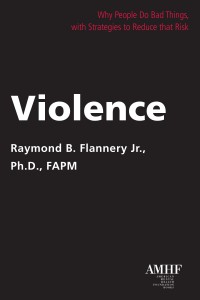New England Psychologist Reviews Violence by Dr. Raymond B. Flannery Jr.
by Evander Lomke on

Why People Do Bad Things, with Strategies to Reduce that Risk
Violence: Why People Do Bad Things, with Strategies to Reduce that Risk by Raymond B. Flannery Jr., Ph.D., FAPM, June 2016 New England Psychologist
Reviewed by Kerry Morrison, Psy.D.
This new publication by Raymond Flannery called Violence: Why People Do Bad Things, with Strategies to Reduce that Risk, serves as a useful handbook for understanding the roots of violence and its causes and effects as well as offering strategies to decrease risk.
As most readers know, violence is rampant in the world in which we live. Flannery opines that America is a culture of violence and it is a national public health problem of epidemic proportion.
The U.S. outranks most other countries in the industrialized world in terms of the number of violent crimes, e.g., assault, rape, robbery and is number one in murder according to Flannery. The author adeptly uses compelling and contemporary findings from the medical and behavioral sciences to illustrate and bring to life sociological and criminal statistics.
It has been about 25 years that researchers in the field of violence prevention have been studying violence in order to deepen understanding of its roots and to decrease risk. In this thin, but comprehensive volume, the author seeks to address how violence can be contained and curtailed giving coping strategies for individuals, families and communities.
Although Flannery states that this book was written for high school and college students, along with first responders, it has application for teachers, clients and clinicians as well. The Figures and Tables given are simple yet helpful graphics that can be used as handouts in various educational, community and clinical venues.
The inclusive review of theories of violent behavior, such as why people commit heinous acts including harming children, is informative, interesting and clinically relevant. Flannery’s emphasis on domains of good health, specifically attachment, mastery and meaningful purpose offer a holistic, strength-based perspective that is well grounded in theory and practice.
Information on Elder Abuse, Chronic PTSD, Recovery: Help for Victims and the Assaulted Staff Action Program (ASAP) is especially valuable to practitioners. Although the book contains difficult statistics and stories about violence, the presentation of strategies for coping with these behaviors and acts offers hope for recovery and resilience.
Flannery’s message that an individual and group sense of community and belongingness is needed for the cultural climate to change and for violence to substantially diminish will resonate with many readers. This book is an essential publication for anyone interested in violence prevention at both individual and community levels.
Kerry Morrison, Psy.D. is a licensed psychologist in private practice in Greenfield, Mass.








 Host Companion
Host Companion